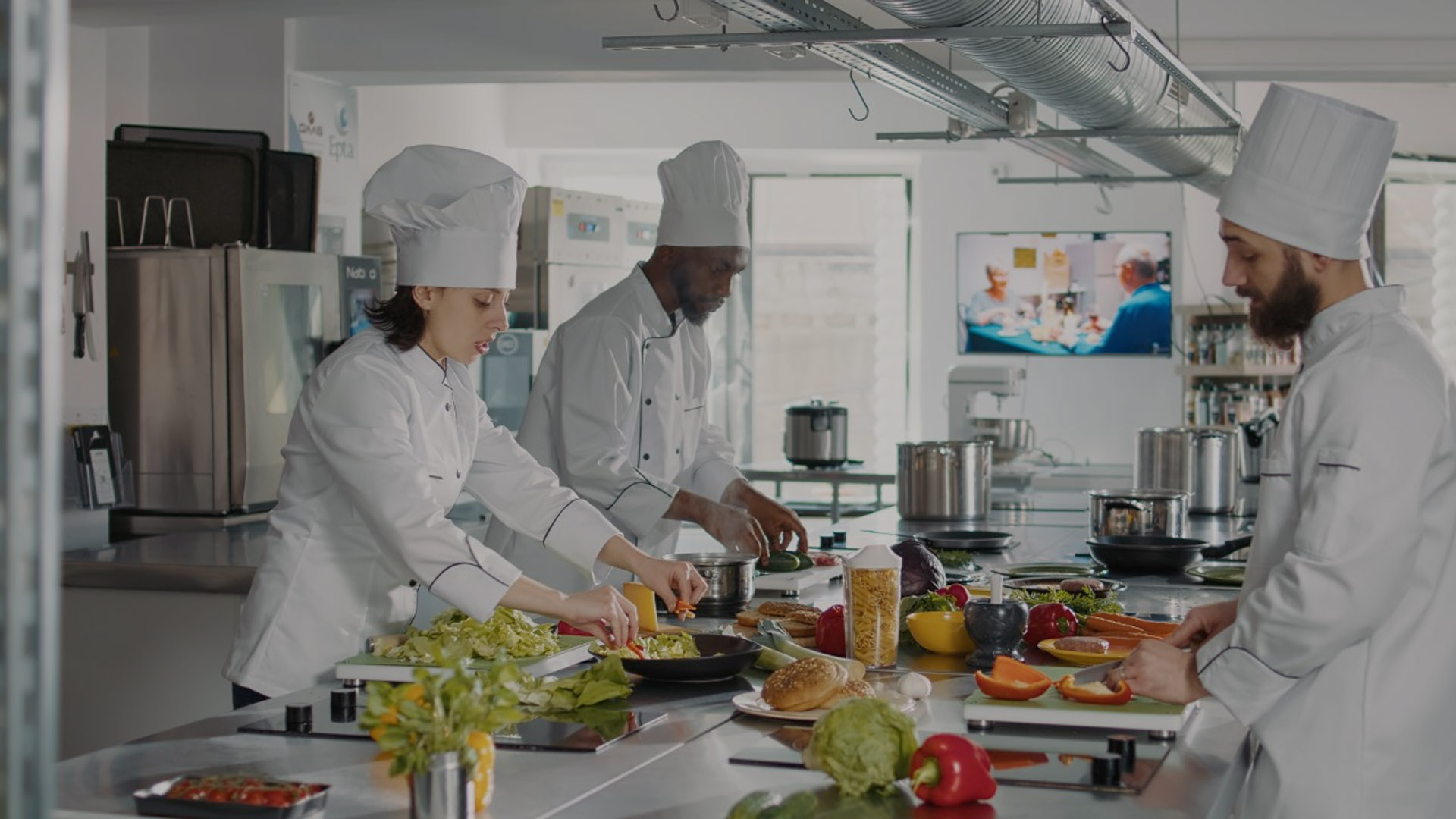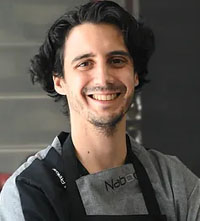
Navigating Culinary Roles

The MTA to Participate in the EU-Funded Cross-Re-Tour Project
April 28, 2024
Horeca Wine Reviews
May 1, 2024Article by the Mediterranean Culinary Academy (MCA)
As discussed in previous articles, food is a potent form of communication, offering insights into individuals and entire cultures. Recipes, in particular, serve as conduits for technology, biodiversity, and societal values - whether pragmatic or elaborate. However, amidst this culinary abundance, there's a subtle confusion emerging: the blurring of roles between communicators and Chefs.
There was a time when Chefs were the unseen heroes, hidden behind the kitchen pass. They weren't the polished hosts we now see on TV or Instagram, donning big smiles and exuding jovial personalities.
These Chefs were, for all intents and purposes, culinary pirates - indulging in excess, with a look that spoke of sleepless nights.
Their world was a mix of chaos and order, and their disdain for outsiders stemmed from an inability to comprehend the peculiar workings of their kitchen realm.
Fast forward to today, and the image of a Chef has undergone a transformation. While some traits persist, such as the need for readiness, organizational prowess, efficient procurement, and waste minimization, the modern Chef is no longer confined to the kitchen pass.
They now walk among diners, engage in marketing, and achieve recognition. Yet, achieving the esteemed status of a Chef still demands years of hard work.
The confusion arises when we label anyone capable of whipping up a few tasty dishes as a ‘chef’. This oversimplification undermines the essence of what it truly means to be a Chef. A Chef is not merely someone skilled in the kitchen but a leader and inspiration, capable of discerning food quality from a single bite.
Their extensive palate, shaped by global culinary experiences, enables them to understand not just the cost but how to enhance the value of a dish. A Chef is both playful and consistent, executing a dish flawlessly thousands of times.
It's crucial to distinguish between Chefs and the myriad other roles in the culinary landscape - cooks, marketers, food communicators, importers, TV personalities, bloggers, Instagram influencers, and contestants. While each contributes significantly to the world of food, excellence in one area doesn't equate to being a Chef.
This distinction isn't an attempt to belittle anyone or stir controversy but a call to recognize the specialisation within the industry. In an era where jobs are becoming more specialised, it's time to appreciate the diversity of roles within the food domain. Making a decent omelette doesn't automatically confer the title of Chef.
Consider the Instagram influencer meticulously crafting recipes, filming immersive videos with crisp audio (ASMR), and investing time and resources in visually captivating content. Their role is undoubtedly commendable, but it's distinct from the Chef poring over supplier lists, meticulously costing a menu.
Ultimately, our discourse around food needs a recalibration. The expanding realm of food-related professions, extending beyond traditional kitchens to digital platforms, demands nuanced language. It's a plea for respect within the industry and an acknowledgment that being a food communicator is not synonymous with being a Chef.
Both roles are valuable, each requiring its unique set of skills, and it's time we recognize and celebrate this diversity.
In our digitally saturated lives, food content is omnipresent on our screens - phones, laptops, and TVs alike.
As discussed in previous articles, food is a potent form of communication, offering insights into individuals and entire cultures. Recipes, in particular, serve as conduits for technology, biodiversity, and societal values - whether pragmatic or elaborate. However, amidst this culinary abundance, there's a subtle confusion emerging: the blurring of roles between communicators and Chefs.
There was a time when Chefs were the unseen heroes, hidden behind the kitchen pass. They weren't the polished hosts we now see on TV or Instagram, donning big smiles and exuding jovial personalities.
These Chefs were, for all intents and purposes, culinary pirates - indulging in excess, with a look that spoke of sleepless nights.
Their world was a mix of chaos and order, and their disdain for outsiders stemmed from an inability to comprehend the peculiar workings of their kitchen realm.
Fast forward to today, and the image of a Chef has undergone a transformation. While some traits persist, such as the need for readiness, organizational prowess, efficient procurement, and waste minimization, the modern Chef is no longer confined to the kitchen pass.
They now walk among diners, engage in marketing, and achieve recognition. Yet, achieving the esteemed status of a Chef still demands years of hard work.
The confusion arises when we label anyone capable of whipping up a few tasty dishes as a ‘chef’. This oversimplification undermines the essence of what it truly means to be a Chef. A Chef is not merely someone skilled in the kitchen but a leader and inspiration, capable of discerning food quality from a single bite.
Their extensive palate, shaped by global culinary experiences, enables them to understand not just the cost but how to enhance the value of a dish. A Chef is both playful and consistent, executing a dish flawlessly thousands of times.
It's crucial to distinguish between Chefs and the myriad other roles in the culinary landscape - cooks, marketers, food communicators, importers, TV personalities, bloggers, Instagram influencers, and contestants. While each contributes significantly to the world of food, excellence in one area doesn't equate to being a Chef.
This distinction isn't an attempt to belittle anyone or stir controversy but a call to recognize the specialisation within the industry. In an era where jobs are becoming more specialised, it's time to appreciate the diversity of roles within the food domain. Making a decent omelette doesn't automatically confer the title of Chef.
Consider the Instagram influencer meticulously crafting recipes, filming immersive videos with crisp audio (ASMR), and investing time and resources in visually captivating content. Their role is undoubtedly commendable, but it's distinct from the Chef poring over supplier lists, meticulously costing a menu.
Ultimately, our discourse around food needs a recalibration. The expanding realm of food-related professions, extending beyond traditional kitchens to digital platforms, demands nuanced language. It's a plea for respect within the industry and an acknowledgment that being a food communicator is not synonymous with being a Chef.
Both roles are valuable, each requiring its unique set of skills, and it's time we recognize and celebrate this diversity.

Kurt Mifsud
A gastronome by profession, Kurt has worked in both fine dining as well as casual
restaurants after which he attended the University of Gastronomic Sciences in Italy where he
contributed to the organisation of the university’s first study trip to Malta. He led the Maltese delegation
to the First edition of the “Slow Food Youth Network International Conference”, at the Milan Expo.
Since founding The Mediterranean Culinary Academy in 2017, Kurt has overseen the development of the award winning monovarietal endemic extra virgin olive oil Bidni, seen over 4000 students pass through its doors, and helped in the organisation of hundreds of different culinary events.
For more information visit https://www.mcamalta.com/
Click here to see Horeca Issue 15 online



